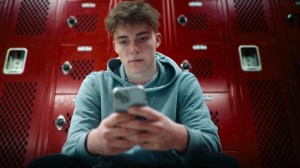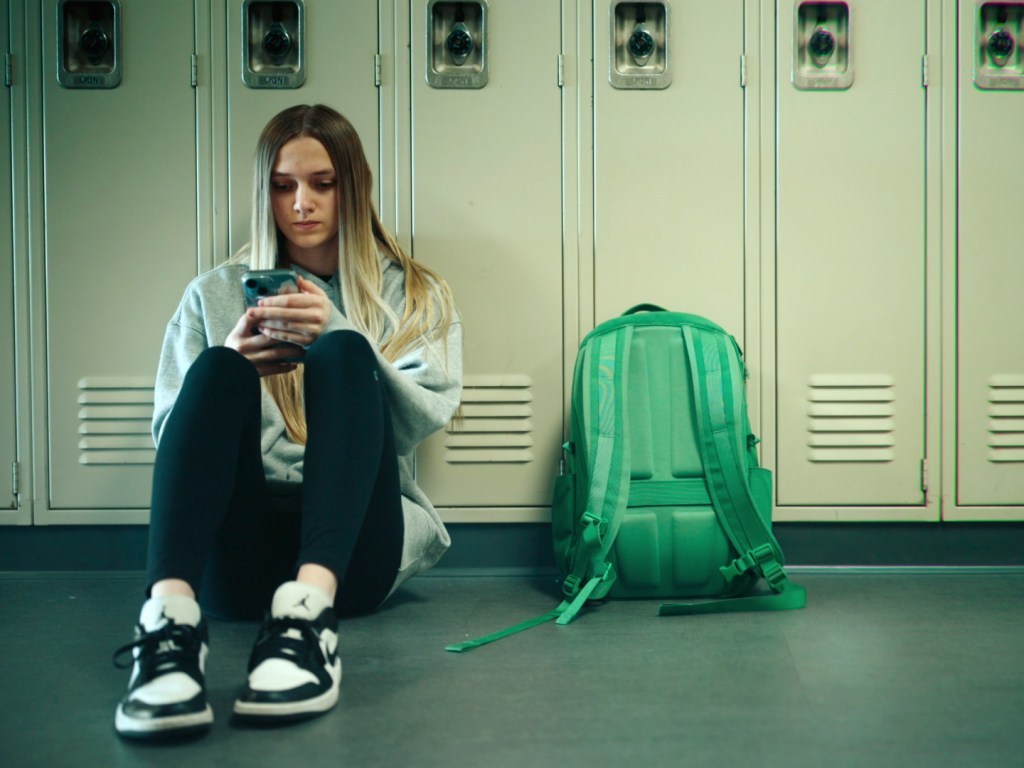It’s been several days since I watched Unknown Number: The High School Catfish documentary on Netflix, and I can’t stop thinking about it. This is a documentary about teens in Beal City, Michigan, who were victims of vicious and cruel cyberbullying for over a year from an unknown number, and it left me shocked and completely unsettled. As a mom of three kids, this documentary left me reeling — and with a deeper fear for my kids’ teenage years than ever before. (Warning: this article contains major spoilers for Unknown Number: The High School Catfish.)

Related story
Netflix’s Unknown Number: Who Was Sending the Shocking Texts to 13-Year-Old Lauryn? (& Why)
It all started when 13-year-old Lauryn Licari and her boyfriend at the time Owen McKenny started getting mean, anonymous text messages from a number they didn’t recognize in Oct. 2020. The messages paused, then resumed in Sept. 2021, getting progressively worse, explicit, and threatening over the next 15 months until the perpetrator was caught.
Cyberbullying is, unfortunately, not rare and can lead to lifelong psychological damage. In fact, one study found that even subtle types of cyberbullying, such as leaving teens out of online group chats, was linked to post-traumatic stress disorder (PTSD) and trauma.

UNKNOWN NUMBER: THE HIGH SCHOOL CATFISH, Owen, 2025. © Netflix / Courtesy Everett Collection
©Netflix/Courtesy Everett Collection
Tessa Stuckey, MA, LPC, founder of Project LookUp, previously told SheKnows, “When teens are excluded or rejected online, their brains process it similarly to physical pain. It attacks their self-worth, identity, and perceived social value — often in a public or permanent way due to the nature of digital platforms.”
For Lauryn and Owen, the cyberbullying they received was much worse than being rejected. The anonymous texter sent hundreds of dark and disturbing texts, including messages like, “u are the ugliest person I’ve ever seen,” “u are worthless n mean nothing,” and “we will make every day miserable.” The texter also told Lauryn to “kill yourself now b****” and threatened, “finish yourself or we will.” The teens would get up to 50 texts a day with threats and insults, including sexually explicit advances toward Owen.
One of the scariest parts while watching this? The parents, the school, and the local authorities were powerless to stop it. The anonymous texter was using phone apps to send the messages from different numbers, so even when the teens would block them, it would start up again immediately. It seemed like everyone was at a loss of what to do and how to act, so these kids just had to continue dealing with the messages for over a year.

UNKNOWN NUMBER: THE HIGH SCHOOL CATFISH, 2025. © Netflix / Courtesy Everett Collection
©Netflix/Courtesy Everett Collection
Obviously, I would want to rip my child’s phone away and throw it in the trash if I saw this, but is that practical? Getting them a new phone wouldn’t help either, as the sender knew intimate details about their lives, including Lauryn’s nickname “Lo,” and would seemingly be able to get their new numbers quickly. It’s such a helpless and scary feeling watching this and just thinking that the kids have to suck it up and deal with it.
For those who’ve seen the documentary, the big twist at the end makes the messages feel all the stranger. Because (spoiler alert!), they were sent by Lauryn’s mom Kendra Licari. An FBI cybersecurity expert tracked the IP address to Kendra, and she admitted to sending the texts as a way to “keep Lauryn close,” which experts have called a type of Munchausen syndrome by proxy. Experts in the documentary also speculated that Kendra had an unhealthy obsession with Owen, considering how some of the text would say things like, “[Owen] will be with me while your lonely ugly a** is alone” and “he wants sex, bjs n making out, he don’t want ur sry a**.” She was arrested and pleaded guilty to two counts of stalking a minor and went to prison until Aug. 2024.
“I don’t know that she really knows why she did it. She does mention in the documentary an assault that happened [to her] when she was right around Lauryn’s age,” filmmaker Skye Borgman told Netflix’s Tudum. “She talks about how scary that was for her to see her only child, her little girl, growing up, and that’s what she really relates to and that’s what she believes led her to sending these text messages and trying to keep Lauryn close.”
Borgman asked Kendra in the documentary why she sent Lauryn these threatening messages, and Kendra simply said, “I was not scared of her hurting herself.” Borgman later told TIME, “Maybe the escalation to telling Lauryn to kill herself is the last attempt to get her as close as she possibly can. But it just seems so incredibly extreme. I mean, she says she never thought Lauren would do it, but I just don’t know any parent who would ever even think of doing something like that.”
For me, the sensational, creepy twist of the mom sending Lauryn these messages doesn’t make me feel any better. Sure, some people might watch this and sigh in relief, thinking, “I’m a good mother; I would never send these messages to my kids.” But if you think that means you have nothing to worry about, it’s sadly not true. According to the Pew Research Center, nearly half (46 percent) of teens reported ever experiencing cyberbullying, with the most common being offensive name calling, followed by spreading false rumors, receiving explicit images they didn’t ask for, being asked constantly where they are, being physically threatened, and having explicit images of them shared without consent.
Sandra Kushnir, a licensed marriage and family therapist, previously told SheKnows what to look for if you suspect your child is a victim of cyberbullying. “Parents should watch for subtle signs like changes in mood, avoidance of social activities, or a drop in academic performance, as these can indicate their child may be experiencing relational bullying,” she said.
Kushnir also shared these tips for kids who are being bullied. “If a child encounters a bully, it is crucial for them to remain calm, avoid retaliation, and seek help from a trusted adult. Parents should create an open, non-judgmental space for communication if they suspect their child is being bullied, ensuring they listen and validate the child’s feelings while helping them navigate the situation.” (And, obviously, this goes without saying: don’t send the threatening, cyberbullying messages to your kids yourself.)
Raising a child right now is harder than ever, but with the school phone bans and other efforts parents are making to protect their kids online, there is some hope. Having open and honest communication with your kids about this stuff is vitally important, no matter how you decide to approach your teens’ technology rules at home.
These celebrity parents are sharing the struggle — and sweetness — of raising teenagers.

